仁爱英语八年级Unit3 Topic 3学案教案
- 格式:doc
- 大小:150.50 KB
- 文档页数:7
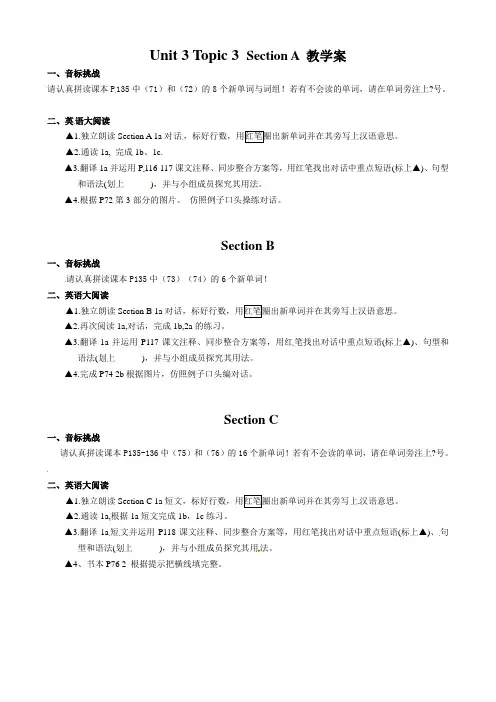
Unit 3 Topic 3Section A 教学案一、音标挑战请认真拼读课本P135中(71)和(72)的8个新单词与词组!若有不会读的单词,请在单词旁注上?号。
二、英语大阅读▲1.独立朗读Section A 1a对话▲2.通读1a, 完成1b、1c.▲3.翻译1a并运用P116-117课文注释、同步整合方案等,用红笔找出对话中重点短语(标上▲)、句型和语法(划上______),并与小组成员探究其用法。
▲4.根据P72第3部分的图片。
仿照例子口头操练对话。
Section B一、音标挑战请认真拼读课本P135中(73)(74)的6个新单词!二、英语大阅读▲1.独立朗读Section B 1a▲2.再次阅读1a,对话,完成1b,2a的练习。
▲3.翻译1a并运用P117课文注释、同步整合方案等,用红笔找出对话中重点短语(标上▲)、句型和语法(划上______),并与小组成员探究其用法。
▲4.完成P74 2b根据图片,仿照例子口头编对话。
Section C一、音标挑战请认真拼读课本P135-136中(75)和(76)的16个新单词!若有不会读的单词,请在单词旁注上?号。
二、英语大阅读▲1.独立朗读Section C 1a短文,标好行数,用红笔圈出新单词并在其旁写上汉语意思。
▲2.通读1a,根据1a短文完成1b,1c练习。
▲3.翻译1a短文并运用P118课文注释、同步整合方案等,用红笔找出对话中重点短语(标上▲)、句型和语法(划上______),并与小组成员探究其用法。
▲4、书本P76 2 根据提示把横线填完整。
Section D一、音标挑战请认真拼读课本P136中(77-78)的6个新单词!若有不会读的单词,请在单词旁注上?号。
二、英语大阅读▲1.独立朗读Section D▲2.再次阅读1短文,完成对号入座的练习。
▲3.翻译P77 1短文并运用P118课文注释、同步整合方案等,用红笔找出对话中重点短语(标上▲)、句型和语法(划上______),并与小组成员探究其用法。
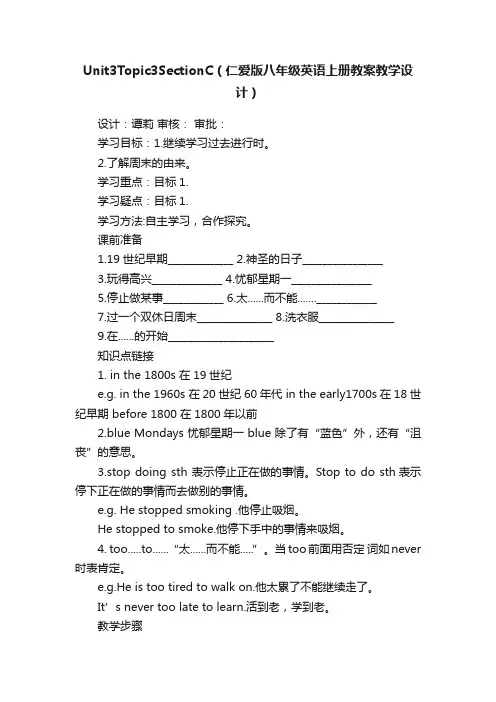
Unit3Topic3SectionC(仁爱版八年级英语上册教案教学设计)设计:谭莉审核:审批:学习目标:1.继续学习过去进行时。
2.了解周末的由来。
学习重点:目标1.学习疑点:目标1.学习方法:自主学习,合作探究。
课前准备1.19世纪早期_____________2.神圣的日子________________3.玩得高兴______________4.忧郁星期一________________5.停止做某事____________6.太......而不能.......____________7.过一个双休日周末_______________ 8.洗衣服_______________9.在......的开始_____________________知识点链接1. in the 1800s 在19世纪e.g. in the 1960s 在20世纪60年代 in the early1700s在18世纪早期 before 1800 在1800年以前2.blue Mondays 忧郁星期一 blue 除了有“蓝色”外,还有“沮丧”的意思。
3.stop doing sth 表示停止正在做的事情。
Stop to do sth表示停下正在做的事情而去做别的事情。
e.g. He stopped smoking .他停止吸烟。
He stopped to smoke.他停下手中的事情来吸烟。
4. too.....to......“太......而不能.....”。
当too前面用否定词如never 时表肯定。
e.g.He is too tired to walk on.他太累了不能继续走了。
It’s never too late to learn.活到老,学到老。
教学步骤Step1 目标揭示,学法指导。
Step2 展示课前准备。
Step3 将重点短语勾画到书上。
Step4看1a, 完成1b.Step5 合作学习1a.Step6 教师点拨1a.Step7 根据重点词组,逐段复述1a.Step8 合作学习2a,2b,注意过去进行时。
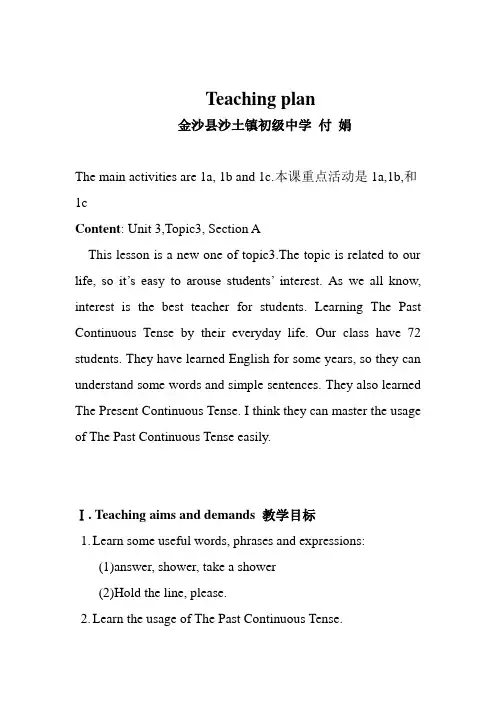
Teaching plan金沙县沙土镇初级中学付娟The main activities are 1a, 1b and 1c.本课重点活动是1a,1b,和1cContent: Unit 3,Topic3, Section AThis lesson is a new one of topic3.The topic is related to our life, so it’s easy to arouse students’ int erest. As we all know, interest is the best teacher for students. Learning The Past Continuous Tense by their everyday life. Our class have 72 students. They have learned English for some years, so they can understand some words and simple sentences. They also learned The Present Continuous Tense. I think they can master the usage of The Past Continuous Tense easily.Ⅰ. Teaching aims and demands教学目标1.Learn some useful words, phrases and expressions:(1)answer, shower, take a shower(2)Hold the line, please.2.Learn the usage of The Past Continuous Tense.—What were you doing at this time yesterday?—I was taking a shower.3.Review the telephone languages.4. Improve students’ speaking and listening ability.5.Develop the spirit of cooperation by pair workⅡkey and difficult points. 重难点The usage of The Past Continuous TenseⅢ Teaching aids 教具Cards ,the power pointTeaching procedures 教学步骤Step1 Greeting(1)T: Good morning, boys and girls. My name is Fu Juan,my English name is Phoebe. I come from Jinsha, I want to make friends with you ,do you want to make friends with me?Ss: Yes , I do.T: Nice to see you .Ss: Nice to see you ,too.T: I hope you will have a good mood in our class.Ss: Thanks.(2)Introduce some class rules to them.If I say give a big hand to Jack. You should clap your hands 5 times. follow me, one, two, one, two, three,etc.Step 2 Lead in(1)Listen to a song.(2)T: What are you doing now?Ss :We are listening to music.T: What were you doing at this time yesterday? Ss:…...(3)Let’s study the Unit 3,Topic3, Section A what were you doing at this time yesterday?(板书) together.Step3 Presentation(1)Ask students to make some sentences of the present and The Past Continuous Tense.(2)Listen to a tape, and answer a question, what was Jane doing at this time yesterday?(3)Listen to the tape again, fill in the blanks according to 1a.(4)Guide the new word, answer and shower(板书并教读). Then read the conversation and role play it.(5)Watch the flash of 1a, find out the sentences with V+ing.(6)Comparing these sentences and find out its rules.Step4 Practice(1)Show some cards and let students make sentences(2)Show some pictures and let students write the words or phrases. Then make up conversations with their partner.Step 5 Consolidation(1)Write down some phrases and telephone languagesPhrases:at this time yesterday hold the linecall sb. to do sth. answer the telephonetake a shower English Cornerdo some cleaning Wash some clothesTelephone languagesThis is … speaking.May I speak to …?Hold the line, please.Answer the phone.(2) Play a game to consolidate the the Past Continuous Tense Step6 SummarySummarize the key points in the class.Homework(1)Make a telephone dialog according to the telephone languages.(2)Recite the new words and new sentences.。
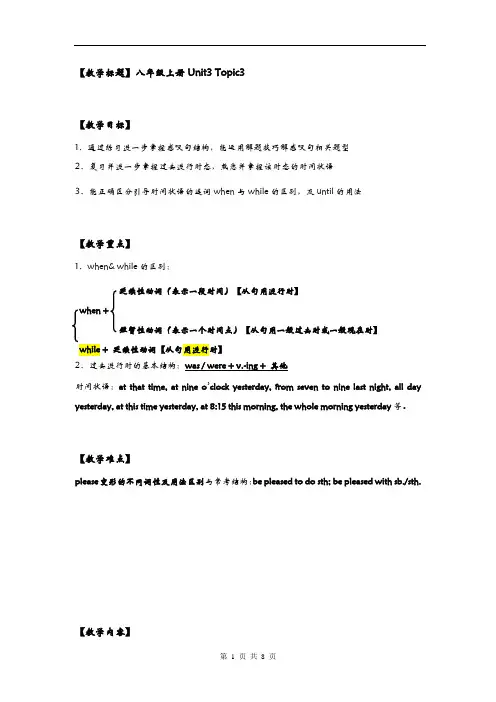
【教学标题】八年级上册Unit3 Topic3【教学目标】1、通过练习进一步掌握感叹句结构,能运用解题技巧解感叹句相关题型2、复习并进一步掌握过去进行时态,熟悉并掌握该时态的时间状语3、能正确区分引导时间状语的连词when与while的区别,及until的用法【教学重点】1、when& while的区别:延续性动词(表示一段时间)【从句用进行时】when +短暂性动词(表示一个时间点)【从句用一般过去时或一般现在时】while + 延续性动词【从句用进行时】2、过去进行时的基本结构:was / were + v.-ing + 其他时间状语:at that time, at nine o’clock yesterday, from seven to nine last night, all day yesterday, at this time yesterday, at 8:15 this morning, the whole morning yesterday等。
【教学难点】please变形的不同词性及用法区别与常考结构:be pleased to do sth; be pleased with sb./sth. 【教学内容】※考点 1 when & while、until原文重现:The telephone rings while Jane is practicing the violin.On the plane from New York, Jim was playing computer games until they served the food.1.1 此处while = when 意为“当……的时候”,引导时间状语从句。
when 与while 区别延续性动词(表示一段时间)【从句用进行时】when +短暂性动词(表示一个时间点)【从句用一般过去时或一般现在时】延续性动词【从句用进行时】Eg. While / When I was having supper, someone knocked at the door.When you leave the room, please turn off the lights.1.2until “直至;直到”(主句用延续性动词)not ... until ... “到……时候才”(主句用短暂性动词)【过手练习】1. Tom was watching TV _______ his father came back.A. whileB. asC. whenD. and2. Now many young people _______ go to bed _______ ten o'clock every night.A. don't; untilB. not; untilC. didn't; untilD. /; until3. Newton was playing under an apple tree _______ an apple fell onto his head.A. whenB. whileC. afterD. before※考点 2 pleasant/agree原文重现:I think classical music is pleasant.I don’t agree. I agree with you.2.1pleasant 形容词“令人愉快的,舒适的”辨别:please 动词,“请;使高兴”pleasant 形容词,作定语时,意为“令人愉快的”,一般用来修饰事物;作表语时,句子的主语一般是事物。
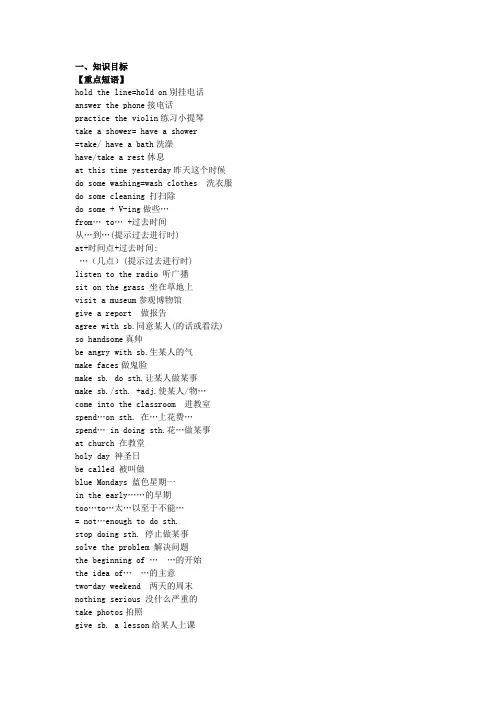
一、知识目标【重点短语】hold the line=hold on别挂电话answer the phone接电话practice the violin练习小提琴take a shower= have a shower=take/ have a bath洗澡have/take a rest休息at this time yesterday昨天这个时候do some washing=wash clothes 洗衣服do some cleaning 打扫除do some + V-ing做些…from… to… +过去时间从…到…(提示过去进行时)at+时间点+过去时间:…(几点)(提示过去进行时)listen to the radio 听广播sit on the grass 坐在草地上visit a museum参观博物馆give a report 做报告agree with sb.同意某人(的话或看法) so handsome真帅be angry with sb.生某人的气make faces做鬼脸make sb. do sth.让某人做某事make sb./sth. +adj.使某人/物…come into the classroom 进教室spend…on sth. 在…上花费…spend… in doing sth.花…做某事at church 在教堂holy day 神圣日be called 被叫做blue Mondays 蓝色星期一in the early……的早期too…to…太…以至于不能…= not…enough to do sth.stop doing sth. 停止做某事solve the problem 解决问题the beginning of … …的开始the idea of… …的主意two-day weekend 两天的周末nothing serious 没什么严重的take photos拍照give sb. a lesson给某人上课【主要句型】1.What was he/she/… doing? 他/她/…在做什么?2.What were you doing? 你在做什么?3.I agree.=I think so. 我同意4.I don’t agree.= I don’t think so. 我不同意5.it is pleasant to do sth. 做…很愉快6.Don’t do that again. 别再做那事了【语法知识】过去进行时指的是过去某个时刻正在进行的动作,或表示过去一段时间内的活动或哪个阶段正在进行的动作,通常与at this time yesterday,at nine yesterday, from…to.. yesterday 等连用。
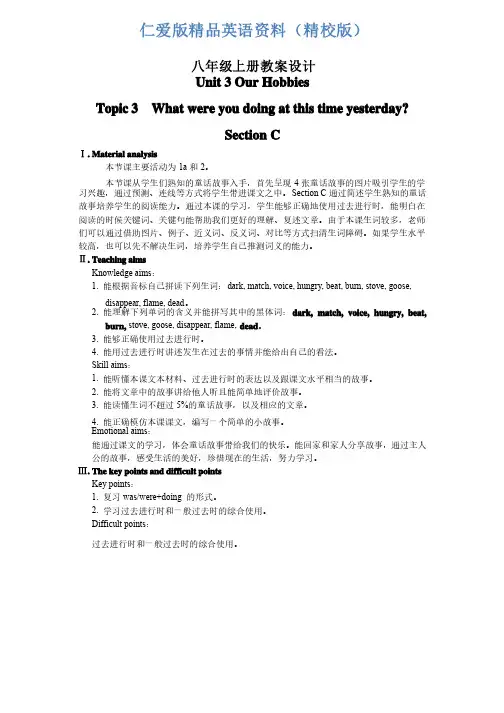
仁爱版精品英语资料(精校版)八年级上册教案设计Unit 3 Our HobbiesTopic 3 What were you doing at this time yesterday?Section CⅠ. Material analysis本节课主要活动为1a 和2。
本节课从学生们熟知的童话故事入手,首先呈现4张童话故事的图片吸引学生的学张童话故事的图片吸引学生的学 习兴趣,通过预测、连线等方式将学生带进课文之中。
Section C 通过简述学生熟知的童话故事培养学生的阅读能力。
通过本课的学习,学生能够正确地使用过去进行时,能明白在阅读的时候关键词、关键句能帮助我们更好的理解、复述文章。
由于本课生词较多,老师们可以通过借助图片、例子、近义词、反义词、对比等方式扫清生词障碍。
如果学生水平较高,也可以先不解决生词,培养学生自己推测词义的能力。
较高,也可以先不解决生词,培养学生自己推测词义的能力。
Ⅱ. Teaching aimsKnowledge aims :1. 能根据音标自己拼读下列生词:dark, match, voice, hungry, beat, burn, stove, goose, disappear, flame, dead 。
2. 能理解下列单词的含义并能拼写其中的黑体词:dark, match, voice, hungry, beat,burn, stove, goose, disappear, flame, dead 。
3. 能够正确使用过去进行时。
能够正确使用过去进行时。
4. 能用过去进行时讲述发生在过去的事情并能给出自己的看法。
能用过去进行时讲述发生在过去的事情并能给出自己的看法。
Skill aims : 1. 能听懂本课文本材料、过去进行时的表达以及跟课文水平相当的故事。
能听懂本课文本材料、过去进行时的表达以及跟课文水平相当的故事。
2. 能将文章中的故事讲给他人听且能简单地评价故事。
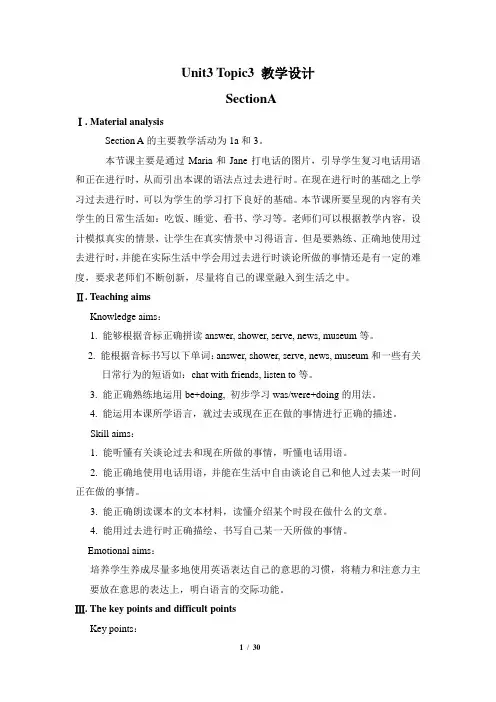
Unit3 Topic3 教学设计SectionAⅠ. Material analysisSection A的主要教学活动为1a和3。
本节课主要是通过Maria和Jane打电话的图片,引导学生复习电话用语和正在进行时,从而引出本课的语法点过去进行时。
在现在进行时的基础之上学习过去进行时,可以为学生的学习打下良好的基础。
本节课所要呈现的内容有关学生的日常生活如:吃饭、睡觉、看书、学习等。
老师们可以根据教学内容,设计模拟真实的情景,让学生在真实情景中习得语言。
但是要熟练、正确地使用过去进行时,并能在实际生活中学会用过去进行时谈论所做的事情还是有一定的难度,要求老师们不断创新,尽量将自己的课堂融入到生活之中。
Ⅱ. Teaching aimsKnowledge aims:1. 能够根据音标正确拼读answer, shower, serve, news, museum等。
2. 能根据音标书写以下单词:answer, shower, serve, news, museum和一些有关日常行为的短语如:chat with friends, listen to等。
3. 能正确熟练地运用be+doing, 初步学习was/were+doing的用法。
4. 能运用本课所学语言,就过去或现在正在做的事情进行正确的描述。
Skill aims:1. 能听懂有关谈论过去和现在所做的事情,听懂电话用语。
2. 能正确地使用电话用语,并能在生活中自由谈论自己和他人过去某一时间正在做的事情。
3. 能正确朗读课本的文本材料,读懂介绍某个时段在做什么的文章。
4. 能用过去进行时正确描绘、书写自己某一天所做的事情。
Emotional aims:培养学生养成尽量多地使用英语表达自己的意思的习惯,将精力和注意力主要放在意思的表达上,明白语言的交际功能。
Ⅲ. The key points and difficult pointsKey points:1. 熟练使用电话用语。
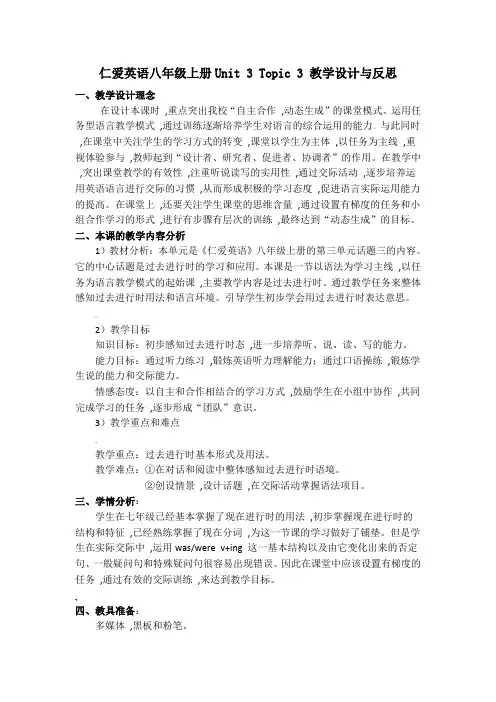
仁爱英语八年级上册Unit 3 Topic 3 教学设计与反思一、教学设计理念在设计本课时,重点突出我校“自主合作,动态生成”的课堂模式。
运用任务型语言教学模式,通过训练逐渐培养学生对语言的综合运用的能力。
与此同时,在课堂中关注学生的学习方式的转变,课堂以学生为主体,以任务为主线,重视体验参与,教师起到“设计者、研究者、促进者、协调者”的作用。
在教学中,突出课堂教学的有效性,注重听说读写的实用性,通过交际活动,逐步培养运用英语语言进行交际的习惯,从而形成积极的学习态度,促进语言实际运用能力的提高。
在课堂上,还要关注学生课堂的思维含量,通过设置有梯度的任务和小组合作学习的形式,进行有步骤有层次的训练,最终达到“动态生成”的目标。
二、本课的教学内容分析1)教材分析:本单元是《仁爱英语》八年级上册的第三单元话题三的内容。
它的中心话题是过去进行时的学习和应用。
本课是一节以语法为学习主线,以任务为语言教学模式的起始课,主要教学内容是过去进行时。
通过教学任务来整体感知过去进行时用法和语言环境。
引导学生初步学会用过去进行时表达意思。
;2)教学目标知识目标:初步感知过去进行时态,进一步培养听、说、读、写的能力。
能力目标:通过听力练习,锻炼英语听力理解能力;通过口语操练,锻炼学生说的能力和交际能力。
情感态度:以自主和合作相结合的学习方式,鼓励学生在小组中协作,共同完成学习的任务,逐步形成“团队”意识。
3)教学重点和难点。
教学重点:过去进行时基本形式及用法。
教学难点:①在对话和阅读中整体感知过去进行时语境。
②创设情景,设计话题,在交际活动掌握语法项目。
三、学情分析:学生在七年级已经基本掌握了现在进行时的用法,初步掌握现在进行时的结构和特征,已经熟练掌握了现在分词,为这一节课的学习做好了铺垫。
但是学生在实际交际中,运用was/were v+ing 这一基本结构以及由它变化出来的否定句、一般疑问句和特殊疑问句很容易出现错误。
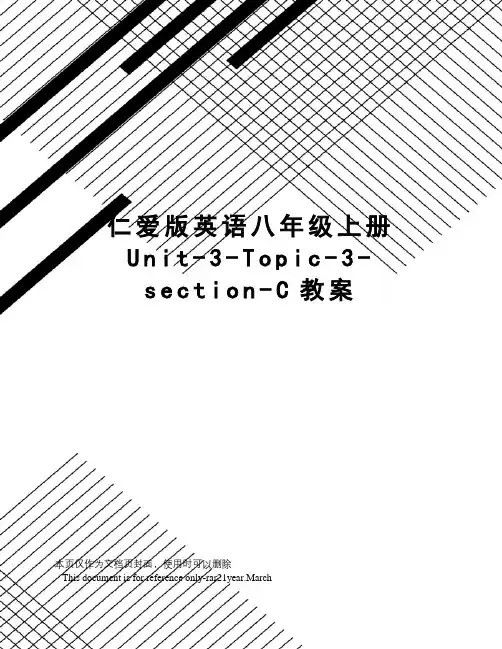
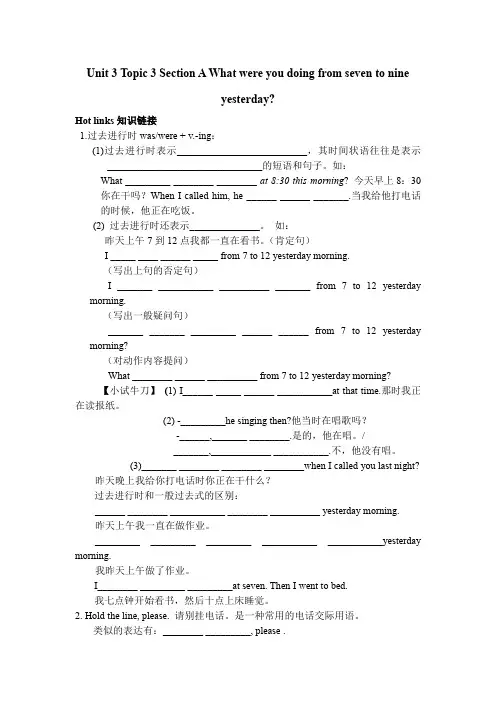
Unit 3 Topic3Section AWhat were you doing from seven to nineyesterday?Hot links知识链接1.过去进行时was/were + v.-ing:(1)过去进行时表示__________________________,其时间状语往往是表示_______________________________的短语和句子。
如:What _________ ________ ________ at 8:30 this morning? 今天早上8:30你在干吗?When I called him, he ______ ______ _______.当我给他打电话的时候,他正在吃饭。
(2) 过去进行时还表示______________。
如:昨天上午7到12点我都一直在看书。
(肯定句)I _____ ____ ______ _____ from 7 to 12 yesterday morning.(写出上句的否定句)I _______ ___________ __________ _______ from 7 to 12 yesterdaymorning.(写出一般疑问句)_______ _______ _________ ______ ______ from 7 to 12 yesterday morning?(对动作内容提问)What ________ ______ __________ from 7 to 12 yesterday morning?【小试牛刀】(1)I______ ___________ ___________at that time.那时我正在读报纸。
(2) -_________he singing then?他当时在唱歌吗?-______,_______ ________.是的,他在唱。
/_______,____________ ___________.不,他没有唱。
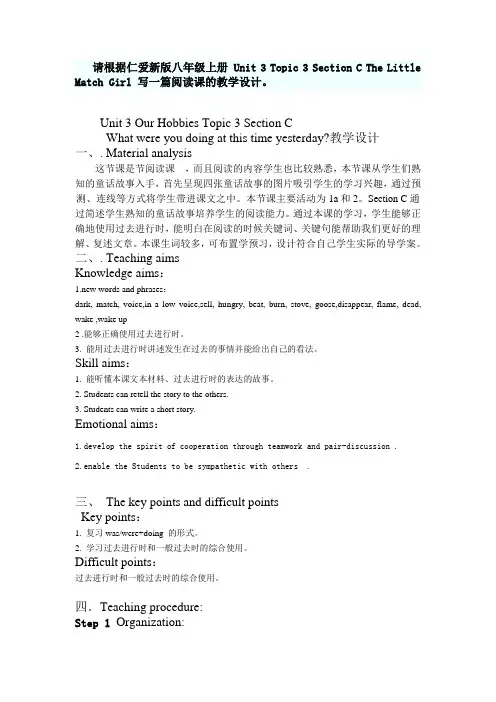
请根据仁爱新版八年级上册 Unit 3 Topic 3 Section C The Little Match Girl 写一篇阅读课的教学设计。
Unit 3 Our Hobbies Topic 3 Section CWhat were you doing at this time yesterday?教学设计一、. Material analysis这节课是节阅读课,而且阅读的内容学生也比较熟悉,本节课从学生们熟知的童话故事入手,首先呈现四张童话故事的图片吸引学生的学习兴趣,通过预测、连线等方式将学生带进课文之中。
本节课主要活动为1a和2。
Section C通过简述学生熟知的童话故事培养学生的阅读能力。
通过本课的学习,学生能够正确地使用过去进行时,能明白在阅读的时候关键词、关键句能帮助我们更好的理解、复述文章。
本课生词较多,可布置学预习,设计符合自己学生实际的导学案。
二、. Teaching aimsKnowledge aims:1.new words and phrases:dark, match, voice,in a low voice,sell, hungry, beat, burn, stove, goose,disappear, flame, dead, wake ,wake up2 .能够正确使用过去进行时。
3. 能用过去进行时讲述发生在过去的事情并能给出自己的看法。
Skill aims:1. 能听懂本课文本材料、过去进行时的表达的故事。
2. Students can retell the story to the others.3. Students can write a short story.Emotional aims:1.develop the spirit of cooperation through teamwork and pair-discussion .2.enable the Students to be sympathetic with others .三、The key points and difficult pointsKey points:1. 复习was/were+doing 的形式。
Unit 3 Topic3 SectionD(仁爱版八年级英语上册教案教学设计)设计:谭莉审核:审批:学习目标:1.听力训练。
2.复习过去进行时。
学习重点:目标2.学习疑点:目标1.学习方法:自主学习,合作探究。
课前准备翻译。
1.洗碗____________2.看报纸_________________3.上周星期天上午九点时你正在做什么?我正在洗澡。
___________________________________________________4.上周星期天我去了公园。
_____________________________________________________5. 你那时正在玩电脑吗?是的,我是。
_______________________________________________________6. 请别挂断。
____________________________7. 我觉得他它一般般。
_________________________________8. 停止做某事___________ 9.多精彩的一天啊!____________10.回家_______________教学步骤Step1目标揭示,学法指导。
Step2 听1,独立完成1.Step3 合作完成2.Step4 合作完成3,注意过去时和过去进行时的区别。
Step5 合作学习4a,4b.巩固提高一.选择。
1.---May I speak to Jane? This is Maria.---_____.She is in her bedroom.A.Hold the line,pleaseB.I am JaneC.Yes, I am.D.Speaking2.---What ____you ____at this time yesterday?---I was watching TV with my family.A.are,doingB.were, doingC.do, doD.did, do3.---Yao Ming is a great basketball player.---____.Many people like him very much.A.I agree with youB.I don’t agreeC.I don’t think soD.That’s OK4.Don’t be angry ____me. I ‘ll study hard.A.inB.onC.ofD.with5.Jim ___in class. So his teacher was very angry.A.listened to teacherB.make facesC.answered questionsD.helped others6.Don’t make him _____like that.A.to walkB.walkingC.walkD.walks7.They came here in ____.A.1980’sB.the 1980s’C.the 1980sD.1980s8.It’s time for class.The students stopped _____.A.talkingB.to talkC.talkD.talked9.His sister is ____young ____carry the box.A.much,toB.so, thatC.too, toD.very ,to10.---Don’t be late for class next time.---Sorry,_____.A.I won’tB.I willC.I doD.I am二.完形填空。
Unit3 Topic3 Section C 优质课教案(福建省)教学设计仁爱版八年级上Uni3 Our hobbiesTopic 3 What were you doing at this time yesterday?Section C the little match girl授课班级:Clas1 Grade8授课者:厦门大学附属实验中学教材分析本节课的授课内容是本册书第三单元的第三个话题的section c部分,主要内容是一篇学生很熟悉的安徒生的童话故事《卖火柴的小女孩》得简易版。
1a通过匹配图片和故事标题、分享故事的活动,激发学生的学习兴趣并激活已有背景知识,帮助学生更好的理解阅读文章。
1b通过阅读1a完成表格。
培养学生巡读的阅读技巧,获取故事的时间、地点、天气事件等细节信息,理解文章内容,巩固一般过去时和过去进行时的表达。
1c再次阅读文章为图片写关键词并重写故事,培养学生重构文章结构的写作能力。
学情分析授课对象是本校初二的学生。
从七年级下学期开始,教师在学生的英语学习过程中开始展开文学简易读本和21世纪报的阅读。
经过近一年的培养和训练,大部分学生能够在不借助词典的情况下,顺利完成适合低年级的《书虫》、《典范英语》系列作品的阅读,并在其中积累词汇、句式;分析故事情节、人物性格:归纳主题思想。
教学设计的指导思想在现阶段的英语教学中,教师往往习惯性的把教学重点放语言的能力培养上,而忽视了语言背后的文化信息和情感态度的传递。
基于“阅读促发展”,借鉴“体验学习圈”和“文学圈”理论,黄远振、兰春寿、黄睿(2013)提出了文学体验阅读READ模式,教学模式中的READ由reading,exploring. assessing developing4个词的首字母缩写组成,4个词分别对应阅读、探究、评价和发展4个要素。
READ模式是运用阅读、探究和评价的方法与手段来发展学生三维能力:首先,通过文学阅读扩大词汇量,培养阅读策略,增强阅读兴趣,提升阅读素养;其次,在文学阅读中学习语言形式、意义和培养语用能力,以写的方式促进创意表达;再次,以文学阅读方式大量接触真实的语言,在阅读中培养逻辑性思维、批判性思维和创造性思维能力。
Step1:重点词汇默写1、答复,回答____________2、端上(饭菜);接待,服务_____________3、淋浴__________________4、洗淋浴_______________5、聊天,闲谈____________ 5、消息,新闻___________6、博物馆________________7、鸭子____________8、同意某人的看法,与某人看法一致_______________9、打,击打;(在比赛中)打败(某人)____________10、快乐地,高兴地,幸福地_____________11、令人愉快的,舒适的______________12、勇敢的_______________ 13、一般,不怎么样,凑合___________14、有用的,有益的_______ 15、黑暗的,暗色的;黑暗,暗处___________ 16、嗓音,说话声_________ 17、低声地说_________18、卖出…;出售;转让_______ 19、饥饿的_____________20、燃烧,烧毁___________ 21、消失,灭绝_____________22、火柴,比赛,竞赛;将……配对______________23、醒来;弄醒,唤醒_________24、醒来,唤醒____________25、死的________________ 26、然而,不管怎样___________27、解决(问题)____________ 28、工厂____________29、关闭的________________ 30、祈求,祈祷_________Step2:重点词汇及词组讲解1.乐器musical instrument2.classical music古典音乐folk music民间音乐pop music流行音乐rock music 摇滚音乐country music乡村音乐jazz爵士音乐3.在……三岁的时候at the age of three=when he was three4.开始干某事begin/start doing sth=begin/start to do sth5.神童the wonder boy (wonder:名词奇迹,惊讶动词:想知道,怀疑)6.某人自己by oneself=do sth without any help7.决定干某事decide to do sth8.agreeVi.同意,答应,应允1)agree with用来表示“同意某人的观点、看法”等。
仁爱英语八年级学案Unit 3 Topic 3 一、知识目标【重点短语】hold the line=hold on别挂电话answer the phone接电话practice the violin练习小提琴take a shower= have a shower=take/ have a bath洗澡have/take a rest休息at this time yesterday昨天这个时候do some washing=wash clothes 洗衣服do some cleaning 打扫除do some + V-ing做些…from… to… +过去时间从…到…(提示过去进行时)at+时间点+过去时间:…(几点)(提示过去进行时)listen to the radio 听广播sit on the grass 坐在草地上visit a museum参观博物馆give a report 做报告agree with sb.同意某人(的话或看法) so handsome真帅be angry with sb.生某人的气make faces做鬼脸make sb. do sth.让某人做某事make sb./sth. +adj.使某人/物…come into the classroom 进教室spend…on sth. 在…上花费…spend… in doing sth.花…做某事at church 在教堂holy day 神圣日be called 被叫做blue Mondays 蓝色星期一in the early……的早期too…to…太…以至于不能…= not…enough to do sth.stop doing sth. 停止做某事solve the problem 解决问题the beginning of … …的开始the idea of… …的主意two-day weekend 两天的周末nothing serious 没什么严重的take photos拍照give sb. a lesson给某人上课【主要句型】1.What was he/she/… doing? 他/她/…在做什么?2.What were you doing? 你在做什么?3.I agree.=I think so. 我同意4.I don’t agree.= I don’t think so. 我不同意5.it is pleasant to do sth. 做…很愉快6.Don’t do that again. 别再做那事了【语法知识】过去进行时指的是过去某个时刻正在进行的动作,或表示过去一段时间内的活动或哪个阶段正在进行的动作,通常与at this time yesterday,at nine yesterday, f rom…to.. yesterday等连用。
仁爱英语八年级学案Unit 3 Topic 3 一、知识目标【重点短语】hold the line=hold on别挂电话answer the phone接电话practice the violin练习小提琴take a shower= have a shower=take/ have a bath洗澡have/take a rest休息at this time yesterday昨天这个时候do some washing=wash clothes 洗衣服do some cleaning 打扫除do some + V-ing做些…from… to… +过去时间从…到…(提示过去进行时)at+时间点+过去时间:…(几点)(提示过去进行时)listen to the radio 听广播sit on the grass 坐在草地上visit a museum参观博物馆give a report 做报告agree with sb.同意某人(的话或看法) so handsome真帅be angry with sb.生某人的气make faces做鬼脸make sb. do sth.让某人做某事make sb./sth. +adj.使某人/物…come into the classroom 进教室spend…on sth. 在…上花费…spend… in doing sth.花…做某事at church 在教堂holy day 神圣日be called 被叫做blue Mondays 蓝色星期一in the early……的早期too…to…太…以至于不能…= not…enough to do sth.stop doing sth. 停止做某事solve the problem 解决问题the beginning of … …的开始the idea of… …的主意two-day weekend 两天的周末nothing serious 没什么严重的take photos拍照give sb. a lesson给某人上课【主要句型】1.What was he/she/… doing 他/她/…在做什么2.What were you doing 你在做什么3.I agree.=I think so. 我同意4.I don’t agree.= I don’t think so. 我不同意5.it is pleasant to do sth. 做…很愉快6.Don’t do that again. 别再做那事了【语法知识】过去进行时指的是过去某个时刻正在进行的动作,或表示过去一段时间内的活动或哪个阶段正在进行的动作,通常与at this time yesterday,at nine yesterday, from…to.. yesterday 等连用。
构成:was / were + doing⑴肯定句:They were doing their homework when I came in. 我进来时他们在在做作业。
Lily was watching TV at ten yesterday. 昨天10点钟时,李莉在看电视。
⑵否定句:They weren’t doing their homework when I came in .Lily w asn’t watching TV at ten yesterday.⑶一般疑问句及肯定,否定回答--Were they doing their homework Yes, they were. / No, they weren’t.--Was Lily watching TV at ten yesterday Yes., she was. / No, she wan’t.二、典型例解( ) _______ a museum with my friends at this time yesterday.A. am visitingB. was visitingC. visitedD.will visit分析:B 由at this time yesterday 时间状语可知,动作或事件是持续地发生在过去的某一个确切时间内。
此类情况要用过去进行时态来表示。
( ) is _______ small _______ to school.A. too; to goB. can’t; goC. too; goD. so; to go分析:A 考查固定搭配too … to … 太……而不能……( ) are right. We all agree _______ you.A. toB. forC. ofD. with分析:D 考查固定搭配agree with sb. 其他介词不能用在此处。
( ) was raining hard _______ I got up this morning.A. ifB. whenC. afterD. until分析:B 根据题意“一个动作发生时,另一个动作正在进行”可知when为正确答案。
其他答案不能表示主句在进行的状态。
( )5. Han Wenda is very funny and he often makes his classmates _______.A. laughingB. laughC. to laughD. laughs分析:B make作使役动词时,后面接不带to的动词不定式作宾语补足语。
( ) the early 1800s, many workers called Monday “_______ Monday”.A. BlueB. YellowC. RedD. White分析:A Blue Monday指的是十九世纪早期的“星期一”,即: 工人们经过周末休息后,星期一要上班的情景。
( )7.—You look very sad. What’s wrong—Don’t worry. There is _______.A. something seriousB. serious somethingC. nothing seriousD. serious nothing分析:C 由Don’t worry,可反推“病情不是很严重”,而且修饰不定代词的形容词必须后置,可排除A、B和D。
( ) didn’t hear me. She _______ with Betty.A. talks B .is talking C. talked D. was talking分析:D由第一句话可知,后面要用过去的时态,可排除A、B,根据语境可知,只能用过去进行时态,可排除C。
( )9.—Is Kangkang good at English—Sure. He _______ a lot of time on it every day.A. usesB. costsC. spendsD. pays分析:C s pend ... on表示“在某方面花时间(金钱)”;而pay表示“给……付款”;cost的主语一般是物,而不是人;use在这里不能与on搭配。
根据题意选C。
( ) feel tired, but I don’t want to s top _______.A. workB. to workC. worksD. working分析:D s top to do sth. 指的是“停下来,去做另一件事情”,stop doing sth. 是指“把正在做的事情停下来”,根据句意不能选B, A、C均不能与stop搭配故选D。
三、评价作业I. 词汇(A) 选择正确汉译英:( ) 1. 古典音乐A:Rock music( ) 2. 摇滚音乐B:Classical music( ) 3. 民间音乐C:Folk music( ) 4. 乡村音乐D:Jazz( ) 5. 爵士乐E:Country music(B) 根据句意及汉语提示写出单词,并用其适当形式填空。
6. __________(收集)stamps is my favorite hobby.7. He often makes us __________(笑) in class.8. I was __________(浇)the flowers when my mother came back yesterday.9. Doing exercise can bring us happiness and __________(放松)。
10. I am very happy to make __________(朋友) with you.II. 单项选择( ) 1. What ______ you ______ when your parents came backA. are, doingB. were, doingC. did, doD. do, do( ) 2. My sister and I ______ English.A. am interestedB. are interestingC. are interest inD. are interested in( ) 3. ---What were you doing at 9:00 pm yesterday ---______A. I was in the museum. watched TV.C. I was taking a bath.D. I stayed with my friends.( ) is going ______ a football match this Friday.A. to haveB. haveC. to beD. be( ) 5. Many students are fond ______ country music in our class.A. ofB. atC. toD. in( ) 6. My father ______ TV in the morning.A. used to watchingB. used to watchC. be used to watchingD. is used to watch( ) 7. I quite agree _____ what you say.A. toB. withC. onD./( ) 8. I enjoy _____ to folk music.A. listeningB. listenC. listenedD. to listen( ) 9. I am going to______ this weekend with my parents.A. spendingB. takeC. doD. spend( ) 10. Mr. Smith asked me ______ him ______ Chinese.A. to teach, learnB. teach, to learnC. to teach, to learnD. teaching, learning( ) 11. I was doing my homework ______ someone knocked at the door.A. whileB. asC. atD. when( ) are going to _______ a new factory in the country.A. set upB. setC. setting upD. setting( ) 13. Song Zuying is famous ______ folk songs.A. forB. asC. atD. with( ) 14. Can you ______ your dictionary ______ meA. borrow, toB. lend, fromC. borrow, fromD. lend, to( ) 15. Li Xiang was born ______ July 10th, 1993.A. inB. atC. onD. aroundIII. 句型转换1. I’m going to see a friend this afternoon.(对划线部分提问)__________ are you going to __________ this afternoon2. How about going with me(改为同义句)__________ __________ go with me3. She used to listen to pop music.(变为疑问句,并作否定回答)---__________ she __________ to listen to pop music ---No, he __________. 4. He was living with his grandparents when his parents were at work. (对划线部分提问)__________ __________ he living with when his parents were at work5. He is only seven. He can go to school.(合并为一句)He is old __________ to go to school.6. I play football every day. (对划线部分提问)__________ __________ do you play footballIV. 补全对话。